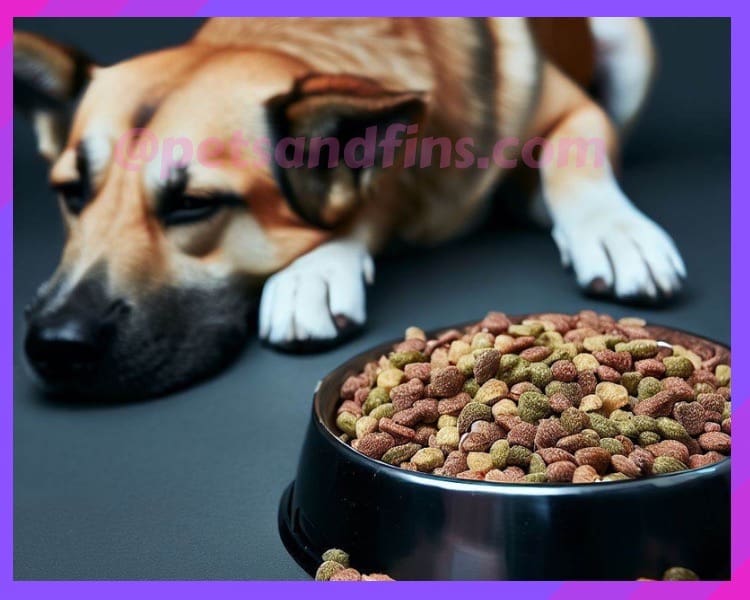If you’ve ever looked at the ingredients list on your dog’s food bag, you’ve likely seen protein listed near the top. But why is protein an important ingredient in dry dog food and is it necessary for all dogs? Let’s find out.
Proteins are responsible for building and repairing tissues, producing enzymes and hormones, and facilitating various metabolic processes within the body.
Adequate protein intake is particularly crucial during a dog’s growth phase when they require more nutrients to support muscle development.
In this blog post, I will explore the importance of protein in dry dog food and its impact on canine health.
Why Is Protein So Important For A Dog?
People often wonder why do dogs need protein. Maintaining optimal health is a crucial aspect of owning a dog. It is not just about providing them with enough food to keep their bellies full, but it also involves giving them the right type of nutrients that will sustain their overall well-being.
It is important to note that not all types of proteins are created equal; some sources are better than others.
For instance, animal-based proteins such as chicken or fish tend to be more bioavailable than plant-based sources such as soybeans or peas.
Bioavailability refers to how easily the body can absorb and utilize the nutrients from a particular source; thus, animal-based proteins are generally considered better quality sources of protein compared to plant-based ones.

The amount of protein required varies depending on factors like age, breed size, and activity level; however, most adult dogs need at least 18% crude protein in their diet.
However, just because a dry dog food brand claims to contain high-quality proteins does not necessarily mean it is true.
It is essential for pet owners always to read labels carefully before purchasing any dry dog food product.
Look out for brands that use real meat as the first ingredient rather than meat by-products or fillers such as cornmeal or wheat gluten.
When purchasing dry dog food, pet owners should always read labels carefully to ensure they are providing their furry friends with the best possible nutrition.
11 reasons why protein is important for dogs
As a dog owner, I have always been conscious of my furry friend’s diet and nutrition. One of the most important components of a healthy diet for dogs is protein. Here are 11 reasons why protein is important for dogs:
1. Muscle Development: Protein is essential for building and repairing muscles in dogs. It helps to maintain muscle mass and strength, which is especially important for active or working dogs.
2. Energy Production: Protein provides energy to dogs by breaking down into amino acids that can be used as fuel. This energy helps them stay active and alert throughout the day.
3. Immune System Support: Protein plays a vital role in supporting the immune system of dogs by producing antibodies that help fight off infections and diseases.
4. Healthy Skin and Coat: Protein is necessary for maintaining healthy skin and coat in dogs. It helps to keep their fur shiny, soft, and free from dryness or flakiness.
5. Digestive Health: Protein aids in digestion by breaking down food into smaller molecules that can be easily absorbed by the body.
6. Weight Management: A high-protein diet can help dogs maintain a healthy weight by keeping them feeling full longer than diets high in carbohydrates or fats.
7. Bone Health: Protein is essential for maintaining strong bones in dogs, especially as they age.
8. Brain Function: The amino acids found in protein play an important role in brain function, helping to improve memory, focus, and cognitive abilities in dogs.
9. Wound Healing: Protein is necessary for wound healing as it helps to repair damaged tissues and promote cell growth.
10. Hormone Regulation: Proteins are involved in regulating hormones such as insulin, which helps regulate blood sugar levels in diabetic dogs.
11. Disease Prevention: A high-protein diet has been linked to a reduced risk of certain diseases such as cancer, heart disease, and diabetes in dogs.
How Much Protein Should A Dog have Daily?
I was unsure about how much protein my dog should be consuming on a daily basis.
After conducting some research and consulting with my veterinarian, I learned that the recommended amount of protein for dogs varies depending on their age, size, and activity level.
According to the Association of American Feed Control Officials (AAFCO), for growing pups, the minimum requirement is 18% dry matter, while adult dogs require at least 8% DM.
But if you want to go above and beyond, following AAFCO recommendations is the way to go. Their guidelines suggest at least 22% DM for growing dogs and 18% DM for maintenance.
It’s important to note that more protein doesn’t necessarily mean better.
In fact, recent studies have shown that excess protein doesn’t provide any additional benefits. So, be sure not to exceed the maximum limit of 30% DM at any life stage.

Additionally, pregnant or nursing dogs also require higher levels of protein to support the growth and development of their offspring.
Size also plays a role in determining how much protein a dog needs.
Activity level is another factor to consider when determining how much protein your dog needs. Dogs that are highly active or participate in activities such as agility training or hunting may require more protein than those who lead a sedentary lifestyle.
As an example, let’s take a look at the protein requirements for a 50-pound adult dog who leads a moderately active lifestyle.
According to the National Research Council (NRC), this dog would require approximately 56 grams of protein per day.
This equates to roughly 224 calories from protein sources. To put this into perspective, let’s take a look at some common sources of protein in dog food.
A 3-ounce serving of cooked chicken contains approximately 21 grams of protein, while a 3-ounce serving of cooked beef contains around 18 grams.
A cup of cooked lentils contains about 18 grams of protein, making it a good option for dogs who may be allergic to meat.
It’s important to note that while protein is essential for your dog’s health, too much can be harmful. Excess protein can put a strain on the kidneys and liver and may lead to health problems such as kidney disease or obesity.
While there are minimum requirements set by organizations such as the AAFCO, it’s important to consult with your veterinarian to determine what is best for your individual pet.
9 Symptoms of too much protein for dogs.
While protein is an essential nutrient for dogs, too much of it can cause various health problems. Here are nine symptoms of too much protein for dogs.
1. Dehydration: Excessive protein intake can lead to dehydration in dogs, as it requires more water to digest protein than other nutrients.
2. Weight gain: Protein-rich diets can lead to weight gain in dogs, especially if they are not getting enough exercise.
3. Kidney problems: Too much protein can put a strain on a dog’s kidneys, leading to kidney damage or failure over time.
4. Digestive issues: Dogs with too much protein in their diet may experience diarrhea, vomiting, or constipation.
5. Bad breath: High-protein diets can cause bad breath in dogs due to the breakdown of amino acids in the mouth.
6. Joint pain: Excessive protein intake can lead to inflammation and joint pain in some dogs.
7. Skin problems: Too much protein can cause skin irritation and itching in some dogs, leading to hot spots or other skin conditions.
8. Behavioral changes: Dogs with too much protein may become hyperactive or restless due to increased energy levels from excess amino acids.
9. Liver damage: In rare cases, excessive protein intake can cause liver damage in dogs due to the buildup of ammonia from excess amino acids.
It’s important for pet owners to monitor their dog’s diet and ensure they are getting a balanced amount of nutrients, including proteins, carbohydrates, and fats.
If you notice any of these symptoms in your dog after changing their diet or increasing their protein intake, consult with your veterinarian immediately for proper diagnosis and treatment options before any permanent damage occurs.
Animal Protein Sources In Dry Dog Food
High-quality dry dog foods often contain protein from animal sources such as chicken, beef, lamb, or fish.
Chicken
Chicken is one of the most common protein sources found in dry dog food. It is a lean source of protein that contains essential amino acids that dogs need for optimal health.
Chicken also provides minerals such as phosphorus and selenium which help support strong bones and teeth.
Beef
Beef is another popular protein source in dry dog food. It contains high levels of iron which helps support healthy red blood cells and energy levels in dogs.
Beef also provides zinc which supports a healthy immune system.
Lamb
Lamb is a less common but still effective source of protein in dry dog food. It provides essential amino acids like lysine which supports muscle growth and repair in dogs.
Lamb also contains vitamin B12 which helps maintain proper nerve function.
Fish
Fish-based proteins are becoming more popular in dry dog food due to their high omega-3 fatty acid content.
Omega-3s have been shown to support healthy skin and coats in dogs while also promoting brain health and reducing inflammation throughout the body.
Choosing high-quality dry dog food with appropriate animal-based proteins can greatly benefit your furry friend’s overall health and well-being.
By prioritizing ingredients like chicken, beef, lamb or fish over lower quality sources like meat by-products or plant-based proteins like corn gluten meal you can ensure that your dog is getting the necessary amino acids and nutrients they need to thrive.
Protein Content And Digestibility
One crucial factor to consider when choosing a dry dog food is the protein content and digestibility. Protein is essential for dogs as it provides them with the necessary amino acids that their bodies need to build and repair tissues.
Furthermore, protein plays a vital role in maintaining a healthy immune system, enabling dogs to fight off infections and diseases.
The protein content of dry dog food can vary greatly depending on the brand and type of food. It is important to choose high-quality dry dog food that contains adequate levels of protein from animal sources such as chicken, beef, or fish.
These sources provide dogs with complete proteins that contain all the essential amino acids they require.
In contrast, plant-based proteins such as soy or wheat may not be as beneficial for dogs as they lack some of the essential amino acids.

Another factor to consider when choosing a dry dog food is the digestibility of the protein.
Digestibility refers to how easily a nutrient can be broken down and absorbed by the body. The more digestible a protein source is, the more efficiently it can be used by your dog’s body.
High-quality dry dog foods typically have higher levels of digestible proteins compared to lower-quality brands.
However, just because dry dog food has high levels of protein does not necessarily mean it is easily digestible for your pet.
Some ingredients used in lower-quality brands may actually hinder digestion and prevent your pet from absorbing nutrients effectively.
To ensure optimal digestion and absorption of nutrients from their diet, it is recommended to choose high-quality dry dog foods that contain easily digestible proteins from animal sources.
The Role Of Plant-based Proteins in Dry dog food
As the world becomes more health-conscious, plant-based proteins have emerged as a viable alternative to traditional animal-based proteins.
In recent years, plant-based protein sources have gained popularity in the dog food industry. These sources include peas, lentils, chickpeas, and soybeans.
Not only are these ingredients rich in protein, but they also provide essential nutrients such as fiber and vitamins.
Moreover, plant-based proteins are hypoallergenic and easier to digest than animal-based ones. Plant-based proteins offer numerous benefits to dogs with sensitive stomachs or allergies.
Unlike animal-based proteins that can trigger allergies in some dogs due to their high-fat content or other factors, plant-based proteins are less likely to cause allergic reactions.
Furthermore, plant-based diets have been shown to reduce inflammation and improve gut health in dogs with digestive issues.
Another advantage of plant-based protein is its sustainability. Animal agriculture is a significant contributor to greenhouse gas emissions and deforestation.
By choosing dog food made with plant-based protein sources instead of meat products, pet owners can help reduce the environmental impact of their pets’ diets.
However, it’s important to note that not all plant-based proteins are created equal. Some manufacturers use low-quality sources that may not provide adequate nutrition for dogs.
It’s crucial for pet owners to carefully read ingredient labels and choose products that contain high-quality sources of plant protein.
Despite the benefits of plant-based protein, it’s essential for pet owners not to overlook the importance of animal-derived proteins entirely.
Dogs are omnivores by nature and require a balanced diet that includes both animal- and plant-derived nutrients.
Animal-derived proteins such as chicken or lamb provide essential amino acids that cannot be found in plants alone.
While there has been an increase in the popularity of using plants as a source of dog food ingredients over recent years due to their sustainability factor; it is important for pet owners not to forget about the importance of including animal-sourced proteins in their dog’s diet.
Key Takeaways
In conclusion, protein is an essential ingredient in dry dog food as it plays a crucial role in sustaining optimal health.
The protein content and digestibility of dog food are important factors to consider when choosing the right brand for your furry friend.
High-quality animal-based proteins are more easily digestible and provide a complete amino acid profile that is necessary for maintaining muscle mass, healthy skin, and coat.
However, plant-based proteins can also be a valuable source of protein if they are properly balanced with other nutrients.
It is important to note that not all dogs have the same protein requirements, and their needs may vary depending on their age, breed, activity level, and overall health condition.
Therefore, consulting with a veterinarian or animal nutritionist can help determine the appropriate amount and type of protein for your dog’s diet.
Overall, providing your dog with high-quality dry food that contains adequate amounts of protein can contribute to its overall well-being and longevity.
Is higher protein dog food better?

For healthy adult dogs with no underlying medical conditions, a balanced diet containing moderate levels of protein (around 18-25% on a dry matter basis) is sufficient to meet their nutritional needs.
Protein is an essential nutrient that plays a crucial role in a dog’s overall health and well-being. It helps build and repair tissues, supports immune function, and provides energy.
However, not all dogs require a high-protein diet. The amount of protein your dog needs depends on several factors such as age, breed, activity level, and health status.
Feeding them excessive amounts of protein may actually do more harm than good by putting unnecessary strain on their kidneys and liver.
On the other hand, dogs with certain health conditions such as kidney disease or diabetes may benefit from a customised protein diet that is tailored to their specific needs.
In these cases, it’s important to consult with your veterinarian before making any dietary changes.
It’s also worth noting that not all sources of protein are created equal. High-quality animal-based proteins such as chicken, beef, and fish are more easily digestible and provide essential amino acids that cannot be synthesized by the body.
Low-quality plant-based proteins such as soy or corn may be cheaper but are less bioavailable and can cause digestive issues in some dogs.
In conclusion, whether higher protein dog food is better depends on your individual dog’s needs and circumstances. A balanced diet containing moderate levels of high-quality animal-based proteins should be sufficient for most healthy adult dogs.
However, if you have concerns about your dog’s nutritional requirements or underlying health issues, it’s always best to consult with your veterinarian before making any dietary changes.
Which is the easiest protein for dogs to digest?

One of the easiest proteins for dogs to digest is chicken. Chicken is a lean protein source that contains all the essential amino acids required by dogs. It is also low in fat and easy on the stomach.
Chicken can be fed cooked or raw but should always be boneless and skinless.
Another easily digestible protein source for dogs is fish. Fish contains high-quality protein and omega-3 fatty acids that promote healthy skin and coat in dogs. Fish can be fed cooked or raw but should always be deboned.
Eggs are another great source of easily digestible protein for dogs. They contain all nine essential amino acids required by dogs and are also rich in vitamins A, D, E, B12, riboflavin, and folate.
Eggs can be fed boiled or scrambled but should always be cooked thoroughly before feeding them to your dog.
Turkey is another lean protein source that is easy on a dog’s digestive system. It contains all the essential amino acids required by dogs and is low in fat compared to other meats such as beef or pork.
In conclusion, there are several easily digestible protein sources available for your furry friend’s diet such as chicken, fish eggs turkey among others mentioned above .
These proteins provide high-quality nutrition without causing any digestive issues in your dog.
As always consult with your veterinarian before making any changes to your dog’s diet plan especially if they have any underlying health conditions that need special attention while choosing their food options .
What protein is best for dogs with sensitive stomachs?
Some of the best protein sources for dogs with sensitive stomachs include chicken, turkey, fish, and lamb.
When selecting protein sources for dogs with sensitive stomachs, it is important to consider the quality of the protein. High-quality proteins are easily digestible and contain all the necessary amino acids that dogs need to maintain good health.
Chicken is a popular protein source for dogs because it is highly digestible and contains all the necessary amino acids that dogs need. It also has a low-fat content which makes it ideal for overweight or obese dogs.
Turkey is another excellent protein source for dogs with sensitive stomachs because it has a high nutritional value and contains essential amino acids such as tryptophan which helps in promoting relaxation and reducing anxiety in dogs.
Fish is also an excellent source of protein for dogs because it contains omega-3 fatty acids which help in reducing inflammation in their bodies. It also has a low-fat content which makes it ideal for overweight or obese dogs.
Lamb is another great option as a protein source because it has a unique taste that most dogs love. It also contains high-quality proteins that are easily digestible by most dog breeds.
In conclusion, choosing the right protein source for your dog’s diet can make a significant difference in their overall health and well-being. When selecting proteins for your dog’s diet, always consider their individual needs and preferences while keeping in mind their sensitivity levels.
Chicken, turkey, fish, and lamb are some of the best options available when looking at proteins suitable for those furry friends with sensitive stomachs.
References:
1. Freeman LM et al. (2013). Current knowledge about the risks and benefits of raw meat-based diets for dogs and cats. Journal of the American Veterinary Medical Association.
2. National Research Council (2006). Nutrient Requirements of Dogs and Cats.
3. Bosch G et al. (2015). Protein quality of insects as potential ingredients for dog food.
4. Swanson KS et al. (2013). Choosing appropriate animal models and experimental designs in gastrointestinal physiology research.
5.National Research Council (US) Subcommittee on Dog Nutrition. Nutrient Requirements of Dogs and Cats. Washington (DC): National Academies Press (US); 2006. Available from: https://www.ncbi.nlm.nih.gov/books/NBK231896/
6. Kienzle E, Bergler R. Human-animal relationship of owners of normal and overweight dogs. J Nutr. 2006;136(7 Suppl):1947S-1950S.
7. Freeman LM, Chandler ML, Hamper BA, Weeth LP, Kirk CA. Current knowledge about the risks and benefits of raw meat-based diets for dogs and cats [published correction appears in J Am Vet Med Assoc. 2014 Dec 15;245(12):1350]. J Am Vet Med Assoc. 2013;243(11):1549
